
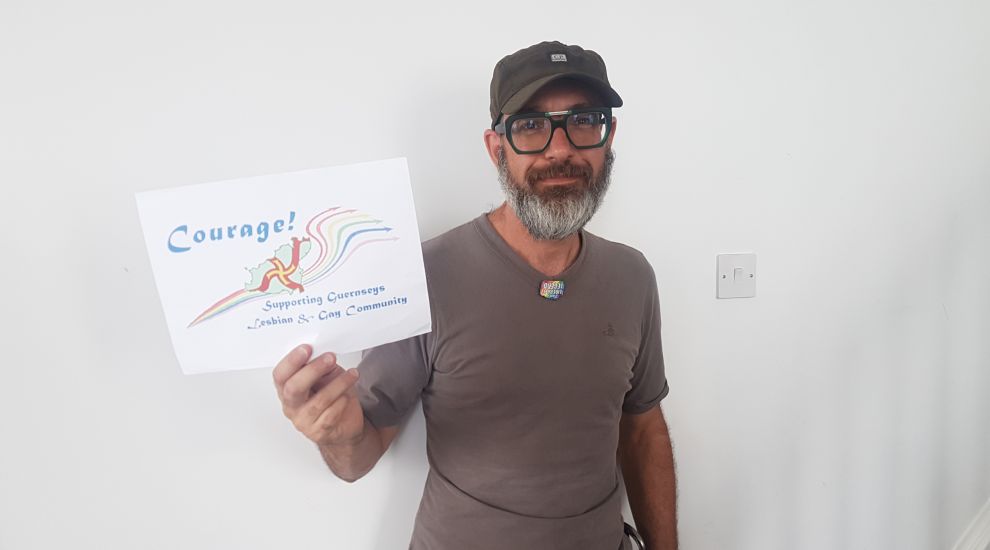
Today's CI Pride events will have a 70s theme to mark the 50th anniversary of the first Pride march in the UK, while celebrating the many changes in society since those days when homosexual relationships were still illegal in Guernsey.
1972 saw people march in London, protesting against the disparity in the age of consent between homosexual and heterosexual couples.
It would be another 43 years before a Pride march was arranged in the Channel Islands - when the charity Liberate organised the first CI Pride in Jersey.
2016 saw the first CI Pride in Guernsey, with the two islands alternating on hosting duties during most years since.
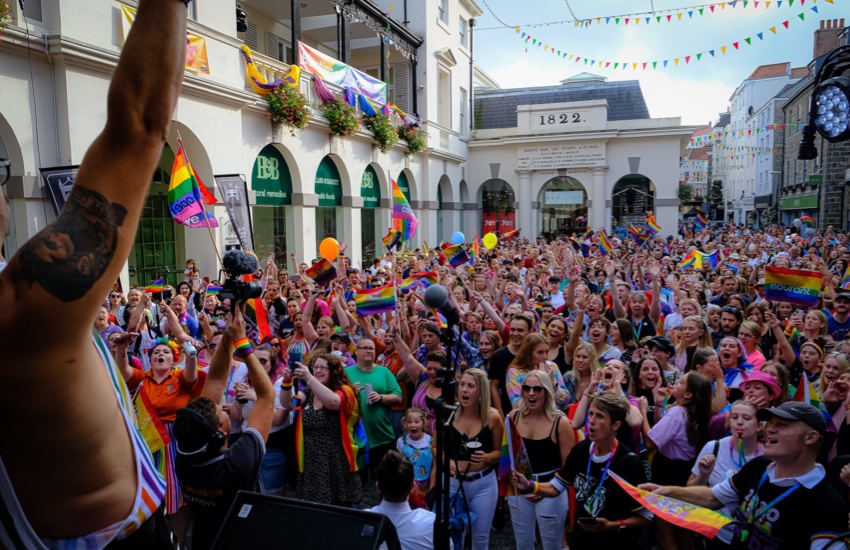
Pictured: Guernsey Pride, 2020. (Paul Chambers)
Today, thousands of people are expected to join with others to both celebrate the changes over the last five decades, while remembering those who they have loved and lost along the way.
Gay sex was first decriminalised in England and Wales in 1967, with the age of consent set at 21.
The Sexual Offences Act (1967) was based on the recommendations of the Wolfenden Report.
Calls to reduce the age of consent to 16 to match the heterosexual age of consent grew louder over the following few years, leading up to the first official Gay Pride march in London, on 1 July 1972, although a smaller and unofficial march had been held in 1970.
That date was chosen as it was the closest to the anniversary of the Stonewall riots, in New York, on June 28 1969. Those protests against police raids on gay bars have long been considered a watershed moment in the gay rights movement. Initially they led to the first gay pride marches in America a year later with events in Chicago, Los Angeles, San Francisco and New York.
Pride marches have been held in countries across the world ever since, with the London event among the largest.
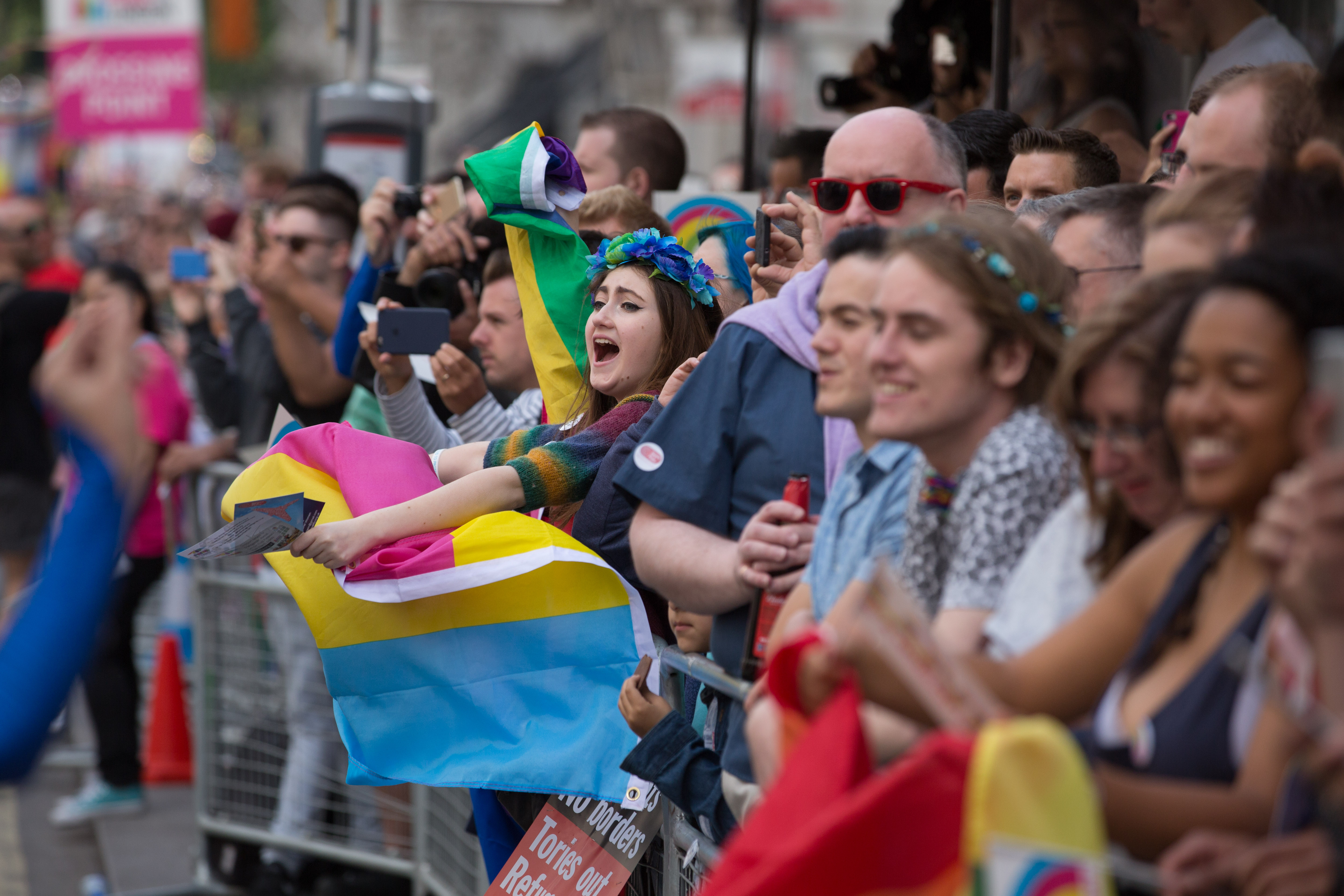
Pictured: London Pride 2019 (James Gourley)
The 2022 London event was coined #AllOurPride and was led by members of the Gay Liberation Front who had attended the 1972 parade organised by the group.
Guernsey is often a step behind other jurisdictions when it comes to social advancements.
With regards homosexual decriminalisation and the age of consent there were a few changes elsewhere before Guernsey caught up in the noughties.
Male homosexuality was decriminalised in Scotland in 1981, in Northern Ireland in 1982 and in Guernsey in 1984.
In 1994 the UK lowered the homosexual age of consent from 21 to 18, before lowering it again in 2001 to 16.
Shortly after, an attempt by then Deputy Carol Steere to lower Guernsey's homosexual age of consent from 21 to 16 was defeated, and the States of the day instead agreed to lower it to 18.
Guernsey eventually lowered the homosexual age of consent to 16 in 2010, bringing the island into line with the UK, and Jersey who had equalised the age of consent in 2006.
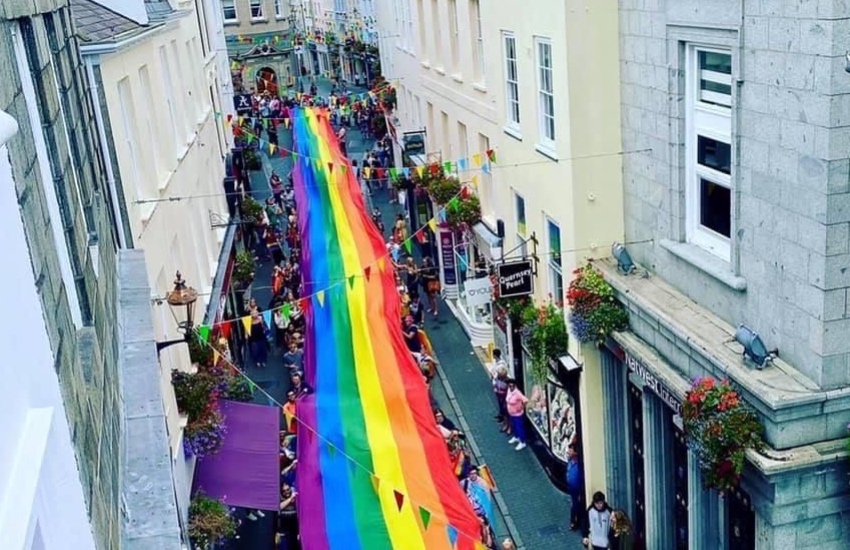
Pictured: Guernsey Pride, 2020 (Paul Chambers)
When the first CI Pride was held in 2015, the Channel Islands were quickly catching up, and often overtaking the UK, in securing equal rights for gay and straight couples.
The UK equality act had been introduced in 2010, with the UK approving same sex marriage in 2013.
Jersey had introduced civil partnerships in 2012, which was later superseded by equal marriage rights. Guernsey debated the pros and cons of both before ultimately deciding to introduce same sex marriage laws in 2016. The law was enacted the following year with two women being the first to commit to each other in Guernsey.
When same sex marriage followed in Alderney, two men were the first to take their vows in 2018.
Since then, Sark followed in 2019, and Herm (which falls under Guernsey's laws) hosted its first same sex wedding during the summer of 2022.
There has often been criticism of efforts to bring about equal rights in the Bailiwick of Guernsey, which has highlighted the need for CI Pride.
When Dits Preece and Allen Jones received hate mail following publicity surrounding their wedding, many more people were supportive of them. Notably a young boy, who wrote to the newly married couple to wish them well.
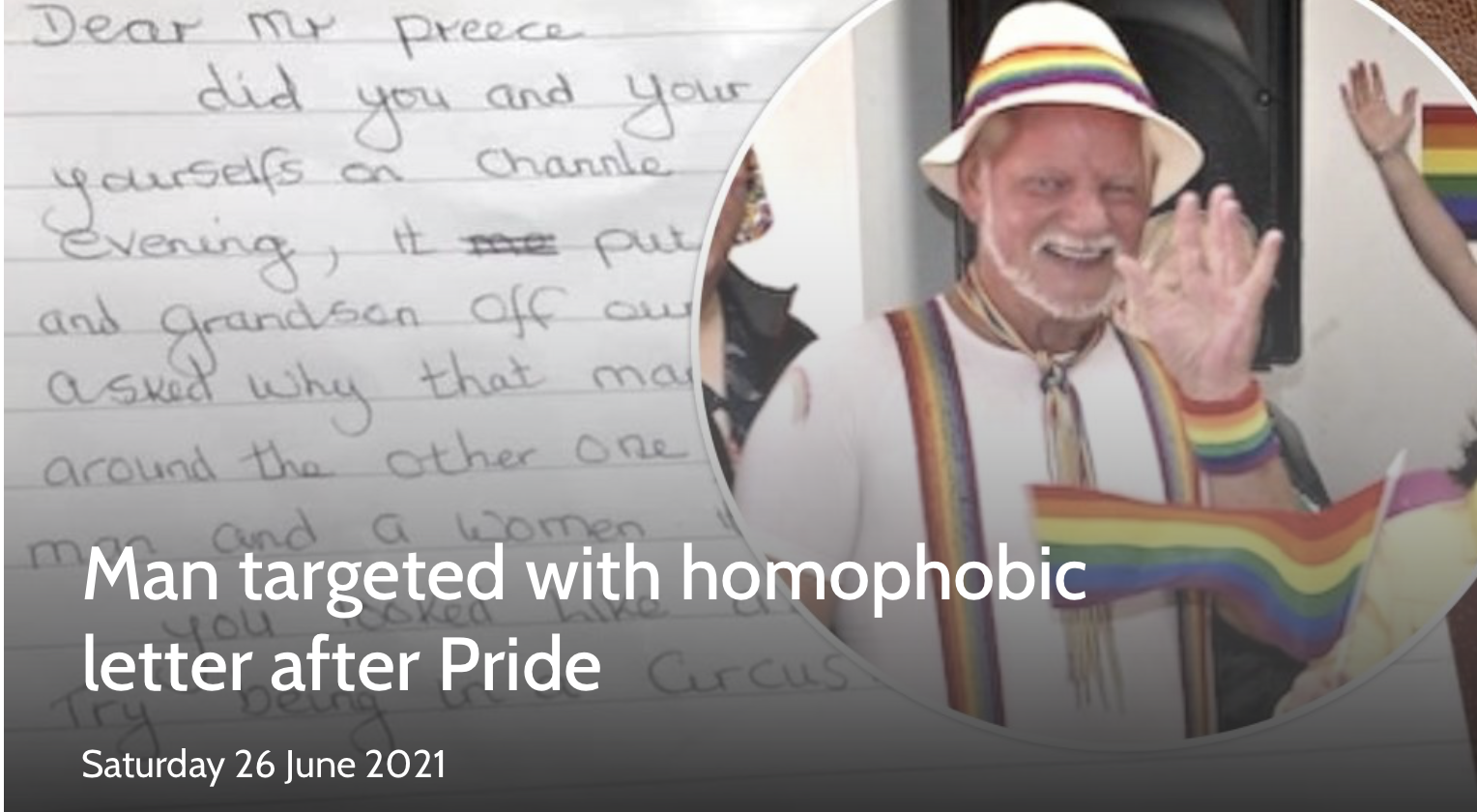
Pictured: Dits Preece and Allen Jones have been subject to homophobic abuse after celebrating their relationship.
In 2020, when CI Pride was hosted in Guernsey and the market steps were painted in the rainbow colours there were a few critical comments. With the steps being painted freshly for 2022, one comment on the story shared on the Bailiwick Express Guernsey Facebook page asked why so much effort goes into Pride, and another expressed hope that the paint would wash off easily.
Kirsty Bougourd, who hours earlier had happily posed for a picture on the steps with her family responded: "comments like yours is why, unfortunately, Pride is still so evidently needed. Pride is about just wanting to be accepted, not judged and not hated on and in some countries not to be murdered - we aren’t asking for much really, when a straight person has never had to face discrimination or hate on a daily basis just because of who they love."
One of the Trustees of Liberate, and a campaigner for equalisation of the age of consent during the 1980s and 1990s, Simon Naftel echoed that view.
"You asked me why it's relevant today? Before I became a trustee of Liberate I asked myself the same question because I was surrounded by my friends, all well adjusted, affluent, travelled. We didn't really have much trouble on a day to day basis. Life is pretty good in our own little middle class bubbles. But you know what? Last year, in COVID, (at Guernsey's smaller Pride event) at that stage, I wasn't really thinking about being a Trustee of Liberate that seriously. I felt that I'd done my time in the trenches, so to speak, back in the 90s. And a lot of time has passed on in almost 25 years. I knew that a friend was looking to leave the island who was a Trustee. And I knew that my name had been floated around. But I was kind of ambivalent about it because 'why bother? What's the point?'
"Well, I suppose I'm the kind of guy who will always be in to talk to a stranger because you kind of learn interesting stuff. So let's wander through and just say hello, and it turned out one of the first chaps I chatted to, well actually he was exactly the kind of folk which Guernsey PLC wants to bring over to the island. And it's really interesting because, you know, he turned out to be a really bright guy, a lawyer. I've done my time in financial services so I know that an awful lot of the auditors and other professionals which Guernsey needs, who are absolutely vital to the success of Guernsey's economy come over to Guernsey but they can work anywhere in the world. You can go to New York and go to the Bahamas, etc. But this guy had chosen to use his degree and his experience as a lawyer, he had chosen to leave his home city and he'd come to Guernsey because it gave him the freedom to live and to work, but also to live his life as a gay man without a risk of death. Because (where he is from) it is not a friendly environment. If your family find out you're gay you can be killed and people are killed every single day.
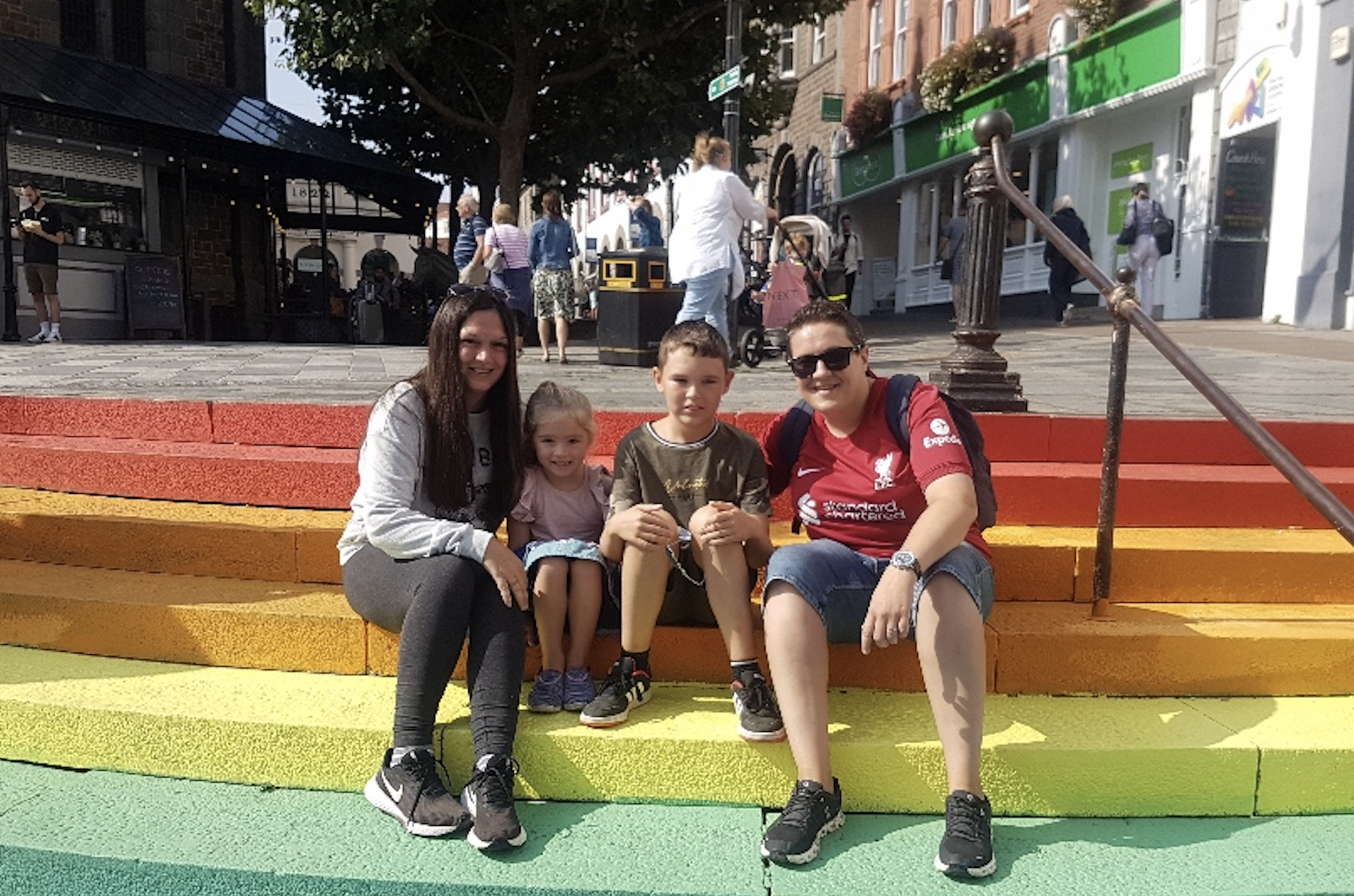
Pictured (l-r): Emma Bailey, Sienna Bailey, Connor Rowe and Kirsty Bougourd.
"So that made me think about actually even in Guernsey there are people who come to Guernsey who have very different experiences, which I thought was very interesting. And then, shortly afterwards I found myself in conversation with somebody who too grew up in the dark days of the 80s. And when I was with this gentleman, it was his very, very first time going out to a gay event. And that was only a year ago. And this was a person who had actively considered suicide and he was so very, very, very stressed. And I listened to him talk and I compared our lives, and it just struck me how very easy it is for your life to be a light source direction to be changed."
Mr Naftel said it is likely that there will be more people in Guernsey who are still hiding their true sexuality.
"It's a choice. And I think we have to respect everybody's individual choice to live a life that they truly want. And I respect that. When I was in my teenage years, I might have wanted to out politicians and things like that but I'm not so angry these days. There's less hypocrisy in the world. There's more openness. It's a very different world and I'm pleased about it."
Mr Naftel was a young teenager when Guernsey legalised homosexual relationships in 1984. He was involved with some of the campaigns for the age of consent to be dropped from 21 to 16, which took more than 20 years to achieve.
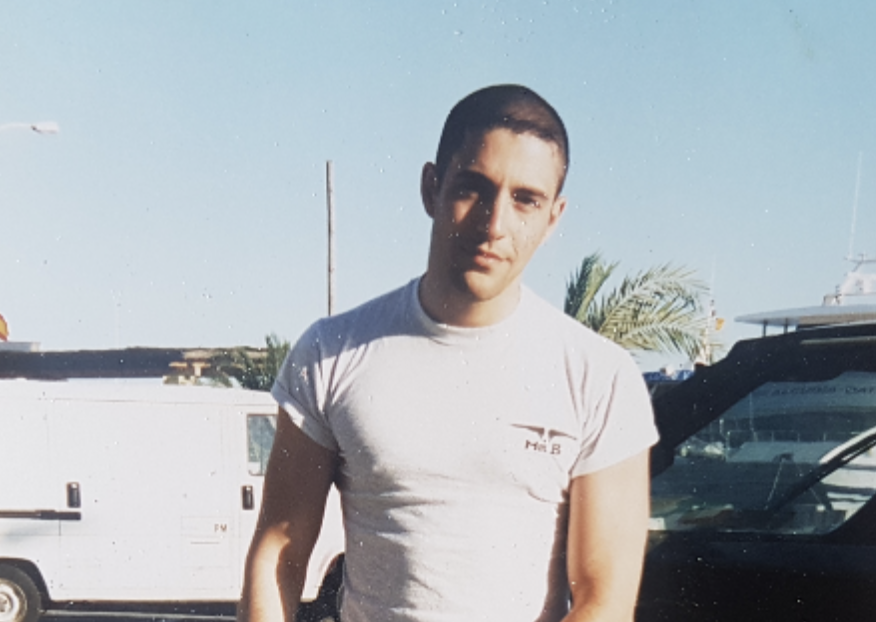
Pictured: Simon Naftel as a younger man.
"I'm sure Peter Roffey won't mind being reminded that he and his group of allies and friends were the first deputies to be brave enough to campaign to bring in legalisation in I believe it was 1984. At that age, I would have been 14. And of course, we all know what we're like when we're 12 and 13. We're all angry and pretty opinionated. I knew if I kissed a boy, I would have been breaking the law. So full stop. I was a criminal and I would be for my whole life ahead of me. The law says that's illegal. So therefore, I think the law is an ass. I thought it was wrong. I thought it was foolish. I thought it was misguided. It made me angry.
"So I fought, I held the law in contempt. We carried on, we live, we partied like nobody's business. But you know what, occasionally friends we partied with in the 80s ceased to be there, because once you've gone to hospital, you didn't come back.
"So, we thank goodness to the Deputies who managed at great personal cost and a lot of vilification to push to change the age of consent.
"You were fighting against brick walls. Because here's the thing, the church were against them, the government was against them. The press were against, the letters in the press well...
"We were just scared. We were just scared kids, we were just angry. We were just angry people. It's nothing about being inspirational, it was just anger. It was anger, and wanting to do what was right. It was our right to equality."
Pictured top: Simon Naftel, holding some of the early branding used by campaign groups in Guernsey during the 1990s.
Comments
Comments on this story express the views of the commentator only, not Bailiwick Publishing. We are unable to guarantee the accuracy of any of those comments.